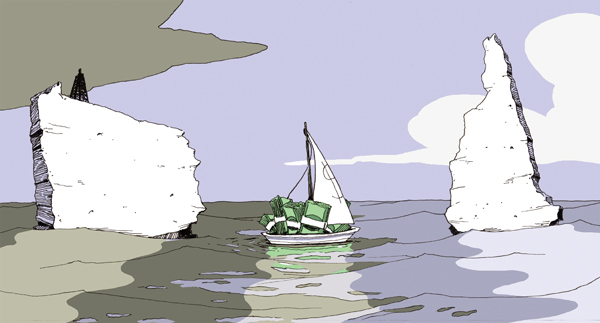Illustration by Carter Mulcahy
The Spirit of Philadelphia
by Steven Grasse
I was born and raised in Pennsylvania. Philadelphia is where I live now. I’m raising a family here. I run a creative agency here. I’m a lifelong student of our city’s history and lore. I love it.
But there’s no need to bury the lede: Fracking is bad, and it’s bad for business in Philadelphia and across the state.
Here’s why.
When I decided to open my distillery, I made sure to put it as far away from Pennsylvania as possible. Why? Because we’re making spirits, and the No. 1 ingredient for good spirits is pure water. No. 2 is grain, ideally grown in healthy soil. Tamworth Distilling is based in New Hampshire because it’s surrounded by the untouched land of the White Mountains, because it sits on one of the purest sources of fresh water in the country, and thanks to topography—not politics—there will never be fracking in the Granite State, because you can’t frack granite.
As a result of my decision, Pennsylvania lost jobs and business: not only the half-dozen employees of the distillery, but the many local farmers who supply our grain and other ingredients, the bars that serve our products, and the hotels and restaurants that welcome our visitors.
Lawmakers who defend fracking do so on the grounds that they’re keeping energy jobs in the state—but why are these jobs somehow more valuable than the ones that are being driven out by pollution and ruined natural resources? As a business owner and a Pennsylvania native, I have a stake in our economy. But in my opinion, the best way to ensure the state’s continued economic health (and growth) is to invest in the right kind of jobs: those that don’t pollute the environment, but instead enrich their communities.
When a local business hires local employees, uses locally produced ingredients or materials and sells its product to other local businesses, everyone wins. A rising tide lifts all boats, and it’s certainly better if those boats are floating in clean water. Pennsylvania’s natural resources have a value that is much greater than that of any fracking interests. We have to think long term, to our kids and our grandkids, and how they’ll make the best of what we leave them.
If you want to see how closely business and environmental interests are tied, take a look at the completely original culinary and booze-infused history of America that all started here in Philadelphia.
William Penn could have created his “Greene Country Towne” anywhere in his ’Sylvania, but he pitched his tent here because we’re smack dead in the middle of two major tributaries that, at the time, were a continually renewing resource of food and fresh water (as well as being the ideal way to ship goods to and from the Old World).
Read that again: The Schuylkill River and the Delaware used to be a source of clean water and healthy fish that had only one head and two eyes. A century ago you could pull a 100-pound sturgeon out of the river and feed your whole block. In 1890 there was an oyster bar on every corner because the Delaware Bay was considered one of the oyster capitals of the world.
Our city is currently experiencing a food and drink cultural renaissance. We are highly regarded as a top-tier foodie destination.
We have great restaurants, great food, great beer and great distilleries, and they all require one thing: clean water. Yet we’re left with no real guarantee that some shortsighted politician won’t allow the extraction of natural gas out of some hapless community in Delaware County and wind up poisoning the entire city. While fracking remains legal in Pennsylvania, anywhere can be the next Flint, Michigan.
If Pennsylvania’s politicians continue to allow barely regulated fracking in the state, they are going to lose more businesses like mine that would have loved to create more jobs here, as well as crucial tourism dollars.
The same goes for our neighbors in New Jersey. Gov. Chris Christie has been fighting tooth and nail to put a pipeline through the Pine Barrens, the largest parcel of undeveloped East Coast land, which stretches from Virginia to Massachusetts, and sits on top of one of the greatest sources of pure water in the country.
Put simply, fracking isn’t only a problem for the environment: It’s bad for the economy and businesses like mine. And the solution isn’t complicated, in fact it’s insanely simple: Stop doing it. Ban it. Vermont has, and now New York has, and those states are experiencing a vibrant agricultural economy as a direct result.
Good food and good drink require good water. When you ruin that, you’re disrespecting people. You’re telling them: Hey, eat poison. Drink poison.
So don’t do it. It’s really that simple.
Steven Grasse is the CEO of Quaker City Mercantile, which handles accounts for Hendrick’s Gin, Sailor Jerry Rum and Art in the Age. His first distillery, Tamworth Distilling & Mercantile, is located in New Hampshire.


